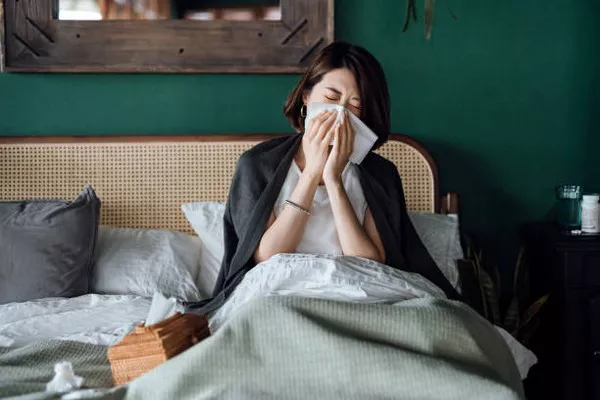Pregnancy is a time of significant physical and hormonal changes, and these changes can sometimes lead to unexpected symptoms, including frequent sneezing. While sneezing during pregnancy is usually harmless, it can be uncomfortable and concerning for expectant mothers. Understanding the causes of sneezing during pregnancy and exploring safe and effective remedies can help alleviate this symptom. This article provides a comprehensive guide on how to stop sneezing during pregnancy, including natural remedies, lifestyle changes, and when to seek medical advice.
Understanding Sneezing During Pregnancy
Hormonal Changes
Pregnancy hormones, particularly estrogen, can cause increased blood flow to the mucous membranes in the nose, leading to nasal congestion and sneezing. This condition is often referred to as pregnancy rhinitis.
Increased Sensitivity
Pregnant women may experience heightened sensitivity to environmental irritants such as pollen, dust, and strong odors. This increased sensitivity can trigger sneezing.
Immune System Adjustments
The immune system undergoes changes during pregnancy to protect both the mother and the developing baby. These changes can sometimes make pregnant women more susceptible to colds and allergies, which can cause sneezing.
Safe and Effective Remedies to Stop Sneezing During Pregnancy
Nasal Saline Sprays
How It Works
Saline nasal sprays help moisturize the nasal passages and clear out irritants, reducing the frequency of sneezing.
How to Use
Use a saline nasal spray as directed, typically a few sprays in each nostril several times a day. Ensure the product is pregnancy-safe and consult your healthcare provider if unsure.
Steam Inhalation
How It Works
Inhaling steam can help soothe irritated nasal passages and reduce congestion, providing relief from sneezing.
How to Use
Boil water and pour it into a bowl. Lean over the bowl with a towel over your head to trap the steam. Inhale deeply for 5-10 minutes. Adding a few drops of eucalyptus or peppermint oil can enhance the effect.
Hydration
How It Works
Staying well-hydrated helps keep the mucous membranes moist and reduces nasal irritation.
How to Use
Drink plenty of water throughout the day. Aim for at least 8-10 glasses of water daily. Herbal teas and clear broths can also contribute to hydration.
Humidifiers
How It Works
Using a humidifier adds moisture to the air, which can help prevent the nasal passages from drying out and becoming irritated.
How to Use
Place a humidifier in your bedroom or other frequently used areas. Clean the humidifier regularly to prevent mold and bacteria buildup.
Acupressure
How It Works
Acupressure involves applying pressure to specific points on the body to relieve symptoms. Certain acupressure points can help reduce sneezing.
How to Use
Press the Yingxiang (LI20) points located on either side of the nostrils at the base of the nasal bone. Apply firm pressure for 1-2 minutes while breathing deeply.
Avoiding Triggers
How It Works
Identifying and avoiding triggers can significantly reduce sneezing episodes.
How to Use
Keep a diary to track potential allergens or irritants. Common triggers include pollen, pet dander, dust, and strong odors. Take steps to minimize exposure, such as using air purifiers and keeping windows closed during high pollen seasons.
Lifestyle Changes to Manage Sneezing During Pregnancy
Maintain a Clean Environment
Regularly clean your living space to reduce dust, pet dander, and other allergens. Use a vacuum with a HEPA filter and wash bedding frequently.
Practice Good Hygiene
Wash your hands frequently and avoid touching your face to prevent the spread of infections that can cause sneezing.
Use Pregnancy-Safe Antihistamines
How It Works
Antihistamines can help reduce sneezing caused by allergies. However, not all antihistamines are safe during pregnancy.
How to Use
Consult your healthcare provider before using any antihistamines. They can recommend pregnancy-safe options and provide guidance on proper usage.
Elevate Your Head While Sleeping
How It Works
Elevating your head while sleeping can help reduce nasal congestion and prevent sneezing.
How to Use
Use extra pillows or a wedge pillow to elevate your head while sleeping. This can help improve airflow and reduce congestion.
When to Seek Medical Advice
Persistent Sneezing
If sneezing persists despite using home remedies and over-the-counter treatments, consult your healthcare provider. Persistent sneezing may indicate an underlying condition that requires medical attention.
Severe Allergies
If you experience severe allergic reactions, such as difficulty breathing or swelling, seek immediate medical attention. Severe allergies may require prescription medications or other interventions.
Infections
If sneezing is accompanied by symptoms such as fever, cough, or body aches, it may be due to an infection. Consult your healthcare provider for appropriate treatment.
Nasal Conditions
If you have a known nasal condition, such as chronic rhinitis or sinusitis, work with your healthcare provider to manage symptoms and prevent frequent sneezing.
Conclusion
Sneezing during pregnancy is a common symptom that can be caused by hormonal changes, increased sensitivity to irritants, and immune system adjustments. While it is usually harmless, frequent sneezing can be uncomfortable and concerning for expectant mothers.
Safe and effective remedies to stop sneezing during pregnancy include using nasal saline sprays, steam inhalation, staying hydrated, using humidifiers, applying acupressure, and avoiding triggers. Lifestyle changes such as maintaining a clean environment, practicing good hygiene, using pregnancy-safe antihistamines, and elevating your head while sleeping can also help manage sneezing.
If sneezing persists or is accompanied by severe symptoms, seek medical advice to address any underlying conditions. By understanding the causes of sneezing during pregnancy and exploring safe remedies, you can alleviate this symptom and enjoy a more comfortable pregnancy.
In conclusion, while sneezing during pregnancy is often a minor inconvenience, taking proactive steps to manage it can improve your overall well-being. Always consult your healthcare provider before trying new remedies or medications to ensure they are safe for you and your baby.
You Might Be Interested In:

